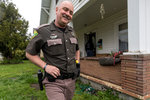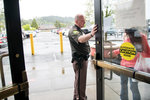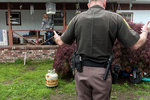






“Don’t run. Don’t lie.”
These are the first words Deputy Kevin Dickey, Lewis County Drug Court’s compliance officer, says to a new client.
The words are not just a strategy to help a participant successfully complete Drug Court, but a mantra for when things get tough for the rest of their lives, he said.
“Dickey told me ‘don’t run, don’t lie’ are the main things,” said Drug Court participant Levi Pickett on Thursday. “Running and lying are all I’ve ever done.”
Lewis County is one of 24 counties in the state that have adult drug courts. According to data collected by the Department of Social and Health Services, Lewis County’s program’s recidivism, or the rate at which graduates reoffend, is half that of the state average.
According to DSHS statistics released this year, 6 percent of Lewis County Drug Court graduates will reoffend within 18 months, compared to a statewide average of 20 percent, and 16 percent will reoffend in 36 months, compared to a 32 percent state average. Only 3 percent of reoffenders in Lewis County commit a felony, compared to 18 percent at the state level.
After a participant graduates, the current charges against them are formally dismissed.
So what is it about Lewis County Drug Court that produces more successful graduates than others?
“We’ve got an incredible drug court program here,” said Drug Court Manager J.P. Anderson. “I think what makes our program different is our compliance officer position.”
Each day, Dickey drives around the county in his unmarked Chevrolet Impala checking up on each of Drug Court’s 40 or so participants in turn.
“I try to find out about them as much as I can,” he said. “It’s my job to hold people accountable and it’s my job to find out when they’re breaking a rule.”
But that’s not the whole job. Dickey has become a mentor, adviser and sounding board to many clients. They call him when they need an unbiased opinion on a situation or a word of encouragement. He works hard to cultivate positive relationships to encourage clients to call him before they make a mistake.
“My phone is ringing all day long,” Dickey said.
The phone calls don’t stop when a participant graduates. Often, they stay in touch, at least for the first few years, he said.
Not all drug courts have a compliance officer, Anderson said.
Anderson also cited the spirit of cooperation between the various partners in the program, including the Lewis County Prosecutor’s Office, Sheriff’s Office, Superior Court, the Eugenia Center and more.
“Lewis County is exceptionally good at working together across agencies at the county level to put together law and justice programs,” he said. “We’re all trying to answer the same question, ‘How are we going to help this participant?’”
“Where are you?” Deputy Kevin Dickey texted to a Drug Court participant for the third time Thursday afternoon.
The first two answers seemed evasive to him. The third wasn’t much better. Participants in their first few months of recovery often struggle to follow his “don’t run, don’t lie” rule.
“I have the best job in the world,” he said. “I get to help people find recovery.”
Dickey, 53, was raised in the area and graduated from Centralia High School. After a stint in the Navy, he returned to Centralia and has worked as a corrections deputy for the Lewis County Sheriff’s Office since 1999. He started as the Drug Court compliance officer about six years ago.
The compliance officer position is still technically under the umbrella of the corrections side of the Sheriff’s Office’s operations and is funded through the Drug Court budget.
Even while he was working in the jail, Dickey said he always made an effort to talk with inmates about their lives and try to influence them in a positive way.
“I’ve always been that person,” he said. “I’ve always taken an interest in people that way.”
Drug Court is not intended for the occasional drug user, but for habitual drug users with multiple felony convictions. Many have been using drugs such as methamphetamine or heroin since their teens. Some have never had a job. Most qualify for Medicaid.
“We only want the tough cases,” Anderson said. “We only accept people who are high risk, high need.”
Drug Court participants have to complete three phases to graduate the program. Phase one includes a participant’s first 60 clean and sober days.
Dickey said he tries to visit all phase one clients at least twice a week.
Participants must have 60 clean days, while passing random urine analysis tests, going to regular counseling and following all program rules to get to phase two.
Phase two takes at least six months to complete, Dickey said. It includes completing moral reconation therapy, or MRT, a cognitive-behavioral therapy program designed for people in the criminal justice system.
Phase three takes at least four months to complete. Participants must have their GED or diploma, pay rent and have a job, among other requirements, to graduate.
The entire program can be completed in a year, with no sanctions. Most participants get some sanctions, Dickey said, but those fall to Superior Court Judge Andrew Toynbee to deal with.
“I’m trying to make a connection,” he said. “I’m trying to get to know the people not as defendants”
The program has recently undergone some significant staffing changes. Anderson took over as Drug Court manager from Jennifer Soper-Baker about nine months ago. Retired Superior Court Judge Nelson Hunt long presided over Drug Court hearings, and in January handed them off to successor Judge Andrew Toynbee.
“Judge Toynbee is a naturally exceptional therapeutic court judge,” Anderson said. “He really does take great care in what he says to the participants.”
Toynbee oversaw Thurston County’s Drug Court program while chief deputy in that county’s prosecutor’s office. Now, he meets with participants from behind the bench each Monday afternoon to assess their progress.
“I think our team and how tight we are in our community is a big part of it,” he said of Drug Court’s success.
About half of all participants graduate. Toynbee said even those who don’t graduate learn valuable lessons from the program, and are less likely to reoffend.
“People’s lives are being transformed by this program,” he said. “We see it every week. We see people making really powerful progress every week.”
The benefits of Drug Court go far beyond the individual participants to their extended families and to the greater community. Twenty drug-free babies have been born to Lewis County Drug Court participants, Dickey said.
It’s not all rosy, though. Dickey recounted a time he dragged a client to jail on Christmas Eve because they’d relapsed.
“They all are better off for the experience,” he said.
“Aren’t you proud of me, Dickey?” Pickett asked on Thursday.
Pickett has been involved in Lewis County Drug Court since September, and is in phase two. He is one of several participants who live in a duplex in Centralia rented by Drug Court. They can stay while they work through the program, provided they follow the rules.
“I never really thought about getting clean until Drug Court presented itself to me,” he said. “It’s all I’ve ever known.”
Pickett said he started drinking and smoking at 16, and later moved on to methamphetamine. He struggled in Drug Court at first, but is now clean and working through the MRT program.
Between visits to clients Thursday, Dickey worried about one participant on “warrant status” who would soon be terminated from the program. He exchanged text messages to check up on others and spent time on the phone with a client in inpatient rehab struggling with the urge to run.
He tells each client to call him if they need advice, and he’ll give an unbiased answer.
“I do develop relationships with all of them because I care about people,” he said. “Everybody’s here (working for Drug Court) because they care about people.”
While he keeps a close eye on them, Dickey said longtime drug addicts develop a talent for secrecy and evasion.
“If I know 10 percent about what they’re doing, I’m doing a really good job,” he said. “You never know when you’re going to walk into an intervention.”
Near the end of the day, he stopped by the Eugenia Center and ran into a number of clients there to meet with counselors or to grab a cup of coffee with fellow participants.
The Eugenia Center provides counseling and case management for Drug Court clients.
“Here they can hang out, if they are struggling with an issue, if they need our assistance, somebody can see them right away,” said
Esmeralda Lybrand, clinical supervisor at the center, said, “We treat them with respect. We also ask them to do the same.”
Steven Dembrowicz, 38, estimated he used meth for more than 20 years. He expects to “phase up” to the second phase of the program Monday.
“I knew I could do it. Dickey, knew I could do it,” he said.
Dembrowicz was at the Eugenia Center in Chehalis when Dickey made the rounds through the city Thursday.
“He’s awesome. He really is out there for us,” Dembrowicz said.
Several clients remembered Dickey coming by their jail cells after an arrest, asking if they’re ready to get clean. Many agree to try Drug Court only after hitting rock bottom, which Dickey described as “a despair that is unfathomable.”
“Drug Court is for those people who have lived through untold horrible things,” he said.
Rodney DeWolf, 55, started using meth in 1975. He went through a couple “dry” spells before Drug Court. Now, he’s in the second phase and trying to rebuild damaged relationships with his family.
“When you’re in recovery, you’re working on yourself,” he said.
He and Daniel Elliott, 59, hope to counsel inmates at the jail after they graduate.
Elliott is getting is getting ready to progress to the third phase. Unlike many addicts, Elliott didn’t start using meth until his mid-30s out of curiosity. He said he liked the energy it gave him, at least at first.
“They really don’t know how good sober is until you lived it,” he said.
Dickey was reluctant Thursday to accept the credit for the program’s success offered by Anderson. Instead, he praised the cooperation and mutual support of all the Drug Court partners, including the clients themselves.
“The magic is that group of people,” he said.